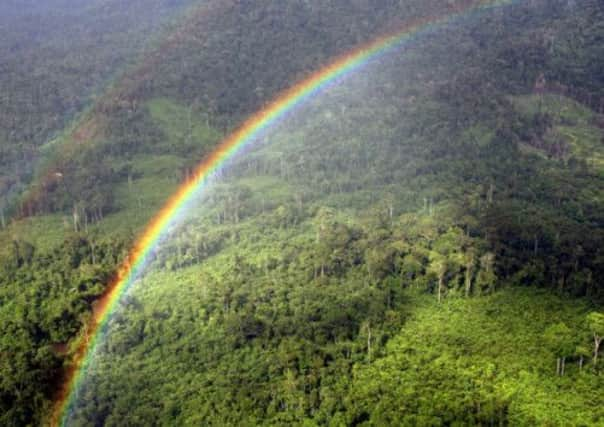Scots scientists lead £4.6m tropical forest study


The experts at Aberdeen University will head a four-year study, funded by the Natural Environment Research Council, which will be focussed on the tropical forests in Southeast Asia.
And their findings will be used by policymakers, climate change researchers, and conservation organisations examining the impact of logging, deforestation and other agricultural practices on the ecology of the area.
Advertisement
Hide AdAdvertisement
Hide AdDr Yit Arn Teh, the principal investigator of the study and a senior lecturer at Aberdeen University , said that human activities were causing irreversible changes to the ecosystems of tropical forests but that the effects of these changes were still poorly understood.
He said: “Tropical forests are being cut down for timber and agriculture to meet global demands for food and natural resources.
This leaves behind landscapes that are completely different from the natural ones that existed before human disturbance.
“Forest clearing and land conversion are leading to habitat loss and species extinctions at a rate that is unprecedented in Earth’s history. This problem is especially acute in South-east Asia, where the pace of land conversion is very high relative to the global average, and where we also see some of the highest levels of biodiversity worldwide.”
He continued: “Logging and agricultural conversion in places like Borneo are threatening rainforest biodiversity; however, we still have a poor understanding of how humans are affecting not only charismatic, well-known species like the Asian elephant, hornbills and orang-utans, but a whole host of other animals, plants and microbes that the public is often less aware of.
“Some of these less publicly visible organisms - like plants, insects and soil microbes - are in fact critical for sustaining living ecosystems because they form the basis of the food web and support communities of higher organisms like birds, monkeys, elephants and other vertebrates. Plants, insects and soil microbes are also responsible for ecological processes like photosynthesis, decomposition and nutrient cycling which, in turn, are globally
important, because they determine whether tropical landscapes release or absorb greenhouse gases with the atmosphere.” Dr Teh continued: “At the moment, we don’t have a clear picture of how tropical forest clearing and land conversion influences the diversity of plants, insects and soil microbes; nor do we fully comprehend how changes in the diversity of these three major groups may influence key ecological processes like photosynthesis, decomposition, nutrient cycling or greenhouse gas exchange.
“This makes it difficult for us to model and predict the environmental effects of human activity in the tropics, both today and in the future. It also makes it challenging to work-out the best means of sustainably managing tropical forests or agricultural landscapes”
Advertisement
Hide AdAdvertisement
Hide AdHe explained that the international research team would be investigating how land-use change in Malaysian Borneo has altered the diversity of plants, insects and soil microbes in the area. “We’ll be trying to understand how changes in the diversity of these three major groups, in turn, influences ecological processes and greenhouse gas exchange,” he said. ““We’ll also be working closely with our colleagues in other research groups to understand how changes to plant, insect and microbial diversity may affect higher organisms like birds or other vertebrates.”
Dr Teh added: “As human activity expands and intensifies around the tropics, answers to the questions we’re posing here about the relationship between land-use change, biodiversity and ecosystem functioning will become increasingly important as we seek ways and means of making our tropical land management practices more sustainable and environment-friendly.” The research collaboration also involves the universities of Cambridge, Edinburgh, Lancaster, Liverpool, Oxford, York, the Centre for Ecology and Hydrology at Lancaster, the Natural History Museum in London, and partner organisations in Malaysia, Japan, Brazil and America.